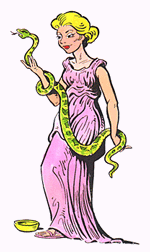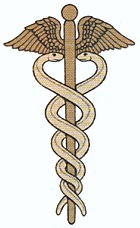A List of gods and goddesses from Greek and Latin Myths — Mythology for all SeasonsAgriculture and Fertility
Greek: Demeter (goddess).
Latin: Ceres (goddess).
Goddess of agriculture. Symbols: sheaf of wheat, poppies, and the cornucopia (the horn of peace and plenty). Chance or Fortune
Greek: Tyche (goddess).
Latin: Fortuna (goddess).
Changing Seasons and Growing Flowers and Fruits
Greek: (no equivalent).
Latin: Vertumnus (goddess).
Dawn
Greek: Eos (goddess).
Latin: Aurora (goddess).
Death
Greek: Thanatos (god).
Latin: Mors (god).
Dreams
Greek: Morpheus (god).
Latin:
(no equivalent).
Earth
Greek: Gaea (goddess).
Latin: Tellus (goddess).
Fields, Forests, Wild Animals, Flocks, and Shepherds
Greek: Pan (god).
Latin: Faunus (god).
The god of nature. Symbols: goats and satyrs. Fire and the Forge
Greek: Hephaestus (god).
Latin: Vulcan (god).
The god of fire and of workers in metal. Symbols: anvil and forge. Flowers
Greek: Chloris (goddess).
Latin: Flora (goddess).
Fruits and Fruit Trees
Greek: (no equivalent goddess).
Latin: Pomona (goddess).

Health
Greek: Hygeia (goddess).
Latin: (no equivalent).
Various spellings: Hygeia, Hygea, Hygia; personification of health and healthy. We now have the derived word hygiene, the science of health, pertaining to health, healthful, living well; the science that deals with the upkeep of health; system of principles or rules for preserving and/or promoting health. Hearth
Greek: Hestia (goddess).
Latin: Vesta (goddess). Goddess of hearth and home. Symbols: the hearth fire.
Winners of the Ancient Olympic events visited the Temple of Zeus to sacrifice to the gods, and half of every animal was delivered to the priests to be prepared for the Olympic feast. That feast, held on the third day of the Games, was marked by a procession. Priests scooped up glowing embers from the fire of Hestia, goddess of the hearth, then carried those embers past spectators singing a hymn to Zeus. Arriving at the Temple of Zeus, the priests mounted the steps and lit the fire in the altar with the embers. There, the priests slaughtered and sacrificed 100 bulls—one at a time—after which the feasting began.
The modern Olympic flame was first seen in the 1928 Amsterdam Olympics where it burned constantly throughout the games. The Olympic flame symbolises purity, the endeavour for perfection, and the struggle for victory. It also represents peace and friendship. The tradition of the Modern Olympic Torch began in 1936 at the Berlin Games, to represent a link between the ancient and modern Olympics, and has since remained as an Olympic custom. In 2004, the torch was ignited, as it was in ancient times, by the sun at Olympia, Greece; and then passed from runner to runner in a relay to the host city. There it was used to light a flame in a cauldron at the Olympic Stadium during the opening ceremony. The flame burned continuously throughout the Games and was extinguished at the closing ceremony. Law and Justice
Greek: Themis (goddess).
Latin: Justitia (goddess).
Literature and the Arts and Sciences
Greek: Muses (goddesses); Calliope (eloquence and epic poetry; Clio (history); Erato (erotic lyric poetry); Euterpe (music and lyric poetry); Melpomene (tragedy); Polyhymnia (sacred poetry); Terpsichore (dance); Thalia (comedy and pastoral poetry); Urania (astronomy).
Latin: Camenae (nymphs); who possess prophetic powers and inhabit springs and fountains; later identified with the Greek Muses.
Love
Greek: Eros (god).
Latin: Cupid (god, also called Amor). The god of love. Symbols: a heart pierced with an arrow.
Even the modern Olympics of 2004 started with an austere mask shattering into pieces, revealing the true focus of this magical night: the human body. Minutes later, a centaur (half human, half horse) launched into the darkness a “javelin”, a shaft of light arching through the air. Then the Greek god Eros descendsed over scantily clad lovers sensually clutching and releasing each other as they froliced in the water. Finally the procession of Greek history began, with float after float parading the progress of Greek sport, science, mathematics, warfare, theater; and, culminated in the persona of the goddess Athena and a replica of the Parthenon. Over all this, Eros hovered, as though the god of love was guiding the course of human history. Of course, all this is ancient history now. We moderns have revived the Games without all this mythological nonsense. Or have we? Consider our present-day Olympian anthem: Immortal spirit of antiquity, Father of the true, beautiful and good, Descend, appear, shed over us thy light Upon this ground and under this sky Which has first witnessed thy unperishable fame. Give life and animation to those noble games! Throw wreaths of fadeless flowers to the victors In the race and in strife! Create in our breasts, hearts of steel! Shine in a roseate hue and form a vast temple To which all nations throng to adore thee, Oh immortal spirit of antiquity. ” The Olympic anthem is played as the Olympic flag is raised during the opening cermonyThroughout the years, many different versions were played and sung at the Olympics. Finally, in 1958, the International Olympic Committee adopted one version as the official anthem of the Olympic games. The loose rendition of Palamas’s poem that appears above is said to be the English version that has been sung at every Olympic games since 1958: The Olympic anthem began as a poem written in 1893 by one of the best known and loved Greek poets of the 20th century, Costas Palamas (1859-1943). Palamas's poem was set to music in 1896 by the Greek composer Spiros Samaras (1853-1917) and introduced at the first revived Olympics in Athens that same year. Today, the Olympic anthem is sung in many languages. Because the lyrics have to follow the music, translations vary. The legacy of this Hellenic song now reaches far beyond Greece. The English version below is a fairly faithful translation of Palamas’s Greek poem: Ancient Immortal Spirit, chaste Father of all that is Beauty, Grandeur, and Truth, Descending, appear with Thy presence Illuminate Thine Earth and the Heavens. Shine upon noble endeavors wrought at the Games on the Track and in the Field. Crown with Thy eternal evergreen branch The bodies, making them stronger and worthy. Dale, Mount, and Ocean, with Thy Light as a white and purple temple, brighten! To Thine Temple, to Thy worship, come all. O Ancient Eternal Spirit! The Olympic MottoIn 1921, Pierre de Coubertin, founder of the modern Olympic Games, borrowed a Latin phrase from his friend, Father Henri Didon, for the Olympic motto: Citius, Altius, Fortius; literally meaning “Faster, Higher, Braver”; however, the universally accepted meaning is “Swifter, Higher, Stronger”. Love and Beauty
Greek: Aphrodite (goddess).
Latin: Venus (goddess).
The goddess of love and beauty. Symbols: doves and sparrows. Marriage

Greek: Hymen (god).
Latin: (no equivalent).
Medicine and Healing
Greek: Asclepius (god).
Latin: Aesculapius (god).
The Aesculapius staff is considered to be the appropriate symbol of medicine, not the Mercury caduceus shown below. The Mercury symbol is incorrectly used by many U.S. medical organizations; especially by military units. Memory
Greek: Mnemosyne (goddess).
Latin:(no equivalent).

Messenger of the gods
Greek: Hermes (god).
Latin: Mercury (god).
Messenger of the gods, god of commerce (trade) and thieves; also, the god of science, eloquence, cleverness, travel, and thievery. Symbols: Winged cap, winged sandals, and a caduceus (a winged staff with two serpents twined around it, suggesting sexual intercourse) which is incorrectly used by some to represent medicine or medical organizations. Moon, Wild Animals, Youth, and Hunting
Greek: Artemis (goddess); earlier, goddess of the moon: Selene
Latin: Diana (goddess); earlier, goddess of the moon: Luna
The goddess of the moon and hunting, patroness of maidens. Symbols: the crescent, stag, and arrows. Music, Poetry, Prophecy, Truth, Medicine, Light; Earlier, the Sun
Greek: Apollo ; (god).
Latin: Apollo (god, also called Phoebus Apollo).
The god of the sun, music, poetry, and medicine. Symbols: The lyre (a musical instrument resembling a harp), arrows, and the sun chariot. Night
Greek: Nyx (goddess).
Latin: Nox (goddess).
Pleasure, Charm, and Beauty in Human Life and in Nature
Greek: Graces (goddesses); Aglaia (brilliance); Euphrosyne (joy); Thalia (bloom).
Latin: (no equivalent goddess).
Portals and Beginnings and Endings
Greek: (no equivalent god).
Latin: Janus (god).
Procreation
Greek: Priapos (god).
Latin: Priapus (god).
Rainbow
Greek: Iris (goddess).
Latin: (no equivalent goddess).
Retributive Justice or Vengeance
Greek: Nemesis (goddess).
Latin: (no equivalent goddess).
Rulers of the gods
Greek: Zeus (god who replaced Cronus).
Latin: Jupiter (god also called Jove; replaced Saturn [father of Jupiter]).
King of the gods and ruler of mankind. Symbols: eagle, thunderbolts, and the oak. Greek: Hera (goddess; also the goddess of women and marriage).
Latin: Juno (goddess; also the goddess of women and marriage).
The queen of the gods, wife of Jupiter (Greek). or Jove (Latin), and patroness of married women. Symbols: the pomegranate, the peacock, and the cuckoo. Sea
Greek: Poseidon (god).
Latin: Neptune (god).
God of the sea, horses, and earthquakes. Symbols: the trident (a three-pronged spear), dolphins, and horses. Sleep
Greek: Hypnos (god).
Latin: Somnus (god).
Socery and Witchcraft; Earlier, the Moon, Earth, and Underworld
Greek: Hecate (goddess).
Latin: Trivia (goddess, whose name means “of the three ways” because, like Hecate, she was worshipped at crossroads).
Strife and Discord
Greek: Eris (goddess).
Latin: Discordia (goddess).
Sun
Greek: Helios (god; later identified with Apollo).
Latin: Sol (god; later identified with Phoebus Apollo).
Underworld
Greek: Hades (god, also called Pluto).
Latin: Pluto (god, also called Dis or Orcus).
Greek: Persephone (goddess).
Latin: Proserpina (goddess).
The gods and goddesses of the underworld, minerals, and wealth. Symbols: Cerberus, the bident (a two-pronged spear). Victory
Greek: Nike (goddess).
Latin: Victoria (goddess).
War
Greek: Ares (god). (no equivalent goddess).
Latin: Mars (god). Bellona (goddess).
The god of war. Symbols: sword, shield, dogs, and vultures. Wealth
Greek: Plutus (god).
Latin: (no equivalent goddess).
Winds
Greek: Aeolus (god).
Latin: (no equivalent goddess).
Wine and Revelry
Greek: Dionysus (god, also called Bacchus).
Latin: Bacchus as well as Liber (god). Liber was also associated with Libera, goddess of the vine.
The god of wine and of an orgiastic religion celebrating the power and fertility of nature, drama, and revelry. Symbols: ivy, grapes, and leopards or panthers. Wisdom, Technical Skill, and Invention
Greek: Pallas Athena (goddess).
Latin: Minerva (goddess).
The goddess of wisdom, war, and weaving. Symbols: the Aegis (a shield on which was fixed the head of Medusa, a woman with snakes instead of hair on her head, whose look turned beholders into stone). Youth
Greek: Hebe (goddess).
Latin: Juventas (goddess).
|
 The Olympic flame is one of the most visible symbols of the modern games. It is a tradition from ancient Greece. During the ancient Games, in Olympia, a sacred flame ignited by the sun burned continually on the altar of the goddess, Hera.
The Olympic flame is one of the most visible symbols of the modern games. It is a tradition from ancient Greece. During the ancient Games, in Olympia, a sacred flame ignited by the sun burned continually on the altar of the goddess, Hera.